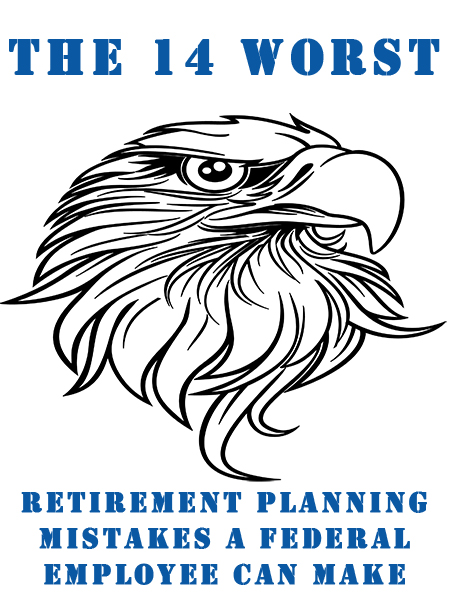The 14 Worst Retirement Planning Mistakes A Federal Employee Can Make
 Retirement is wonderful if you have two essentials — much to live on and much to live for. Make sure you set yourself up by avoiding these retirement planning mistakes.
Retirement is wonderful if you have two essentials — much to live on and much to live for. Make sure you set yourself up by avoiding these retirement planning mistakes.
1. Letting chance chart your course by failing to inform yourself.
When you are thinking about retiring, planning may not be everything, but it’s head and shoulders above whatever’s in second place. This is a mistake too many federal employees make – going it on their own. You need help because federal retirement is more complicated than it looks. So schedule a meeting with your advisor - make sure they are familiar with Federal Benefit Programs. You can also look into pre-retirement counseling seminars that may be available through your agency. (Regardless of how you get there, be prepared with questions – and be ready to be surprised by all the questions and answers that had never occurred to you, as you’ll see below.)2. Being sucker-punched by a little-known rule that leaves you without health insurance
Can you imagine a future without health benefits coverage at a time when the cost of health care is increasing far beyond the cost-of-living and wages? Well, count your lucky stars. Why? Because the government covers 100 percent of its retirees who meet a simple eligibility requirement, whereas only 13 percent companies in the private sector extend such coverage to their retirees (according to The Wall Street Journal). Here’s the scoop: As a rule, you must have been enrolled in the Federal Employees Health Benefits (FEHB) program for the five years immediately preceding your retirement (or have been covered by your spouse’s FEHB policy). If not, you won’t be allowed to carry your coverage into retirement. (Of course, there are some exceptions. For example, if you enrolled in the FEHB at your first opportunity and retired in less than five years, you’d still be covered in retirement. The same holds true if you accept an opportunity to retire early but before you’ve been covered for a full five years.)3. Failing to consider the effect of withdrawing your retirement contributions at separation (before reaching retirement eligibility).
Many federal employees have left government employment and taken a refund of their retirement contributions with them, only to rejoin Uncle Sam’s work force later. So, what would happen to that period of refunded service if you did this? If you are a FERS employee, that period of service would be treated as if it never happened. You’d get no credit for it in determining your eligibility to retire or in calculating your annuity. But if you are a CSRS employee, you would have some options. If that refund were for a period of service that ended before October 1, 1990, you’d have a choice. You could either repay the refund (plus interest) or not pay it. If you didn’t, when you retire, your annuity would be reduced based on the amount you owe and your age. On the other hand, if the refund were for a period of service on or after October 1, 1990, and you didn’t make a redeposit, you’d get credit for the time in determining your eligibility to retire but the time wouldn’t be used in the computation of your annuity.
4. Not getting credit for military service.
You served your country and now that you’re on the civilian side of government, you’d like to get credit for your military service when you retire. Well, you can. But how you do that depends on the retirement system you’re in. If you are a FERS employee, you must make a deposit to get credit for that time. On the other hand, if you are a CSRS employee who was hired before October 1, 1982, you don’t have to make a deposit unless you’ll be hit by the so-called “Catch-62” penalty (see below). However, if you are a CSRS employee hired after that date, you’ll only get credit for that time if you make a deposit. Finally, whether you are covered by CSRS or FERS, if you retired from the military and want to get credit for that time, you’ll not only have to make a deposit but you’ll also have to waive your military retired pay when you retire from your civilian job.5. Falling into the ‘Catch-62’ trap.
Are you a CSRS-covered employee who served in the military after December 31, 1956? Have you made a made a deposit to the retirement fund for that time? If you haven’t, you may get a rude awakening when you retire. Here’s why. If you’re retired and eligible for a Social Security benefit at age 62, your annuity would be recomputed downward by 2 percent for each of those years of military service – because you didn’t fork over the require deposit (that you didn’t know about). So, how big would this Catch 62 hit be? Well, if you had four years of service, your annuity would be reduced by 8 percent. So, if your annuity were $50,000 that would mean a whopping $4,000 cut.6. Getting blindsided by the WEP.
If you’ll be getting all or part of your civilian annuity from CSRS, a retirement system where you didn’t pay Social Security taxes, any Social Security benefit to which you may be entitled probably will be reduced by the Windfall Elimination Provision. If you’ll be getting all or part of your civilian annuity from CSRS, a retirement system where you didn’t pay Social Security taxes, any Social Security benefit to which you may be entitled probably will be reduced by the Windfall Elimination Provision. The WEP cuts the SS benefits of anyone who has fewer than 30 years of substantial earnings under Social Security. And “substantial earnings” really means substantial. For example, in 2005, you’d only have to earn $3,680 to receive four Social Security credits; however, you’d have to earn $16,725 for those earnings to be considered substantial. Word to the wise: the Social Security Administration has no idea whether you’ll be receiving any of your annuity from CSRS – it’s just not in that agency’s bailiwick. So, if you’ll be receiving a CSRS annuity, the estimate of future Social Security benefits you get from them usually will be dead wrong.7. Getting blindsided by the GPO.
If you’ll be getting a CSRS annuity and would be entitled to a Social Security spousal or survivor benefit, watch out. The money you were expecting to receive probably will be wiped out by the Government Pension Offset. It reduces those Social Security benefits by $2 for every $3 you’ll be getting in your CSRS annuity (or the CSRS component in your FERS annuity, if you have less than five years service under FERS).8. Failing to get full credit for all federal service.
Did you ever work as a substitute carrier for the post office, serve with Peace Corps or VISTA, perform volunteer service under the Economic Opportunity Act of 1964, or be employed as a U.S. Capitol guide, etc.? Did you ever work as a substitute carrier for the post office, serve with Peace Corps or VISTA, perform volunteer service under the Economic Opportunity Act of 1964, or be employed as a U.S. Capitol guide, etc.? Well, if you did, you may not know that the time could qualify as creditable civilian service – but only if you claim it, and, in certain cases, make a deposit to the civil service retirement fund. The more creditable service you have, the sooner you’ll be eligible to retire, and, when you do, the larger your annuity will be.Here’s a case where time is money.
9. Not knowing – or forgetting – how the system works.
The retirement scene can be financially bewildering for FERS employees. The retirement scene can be financially bewildering for FERS employees. So, if you’re one of them, you need to be aware of some pitfalls. First, while you often can retire at your minimum retirement age (MRA), if you do so with fewer than 30 years of service, your annuity will be reduced by 5 percent for each year you’re under 62 unless you have 20 years of service and retire at age 60 or later.Second, you’ll be eligible for a special retirement supplement that approximates the Social Security benefit you earned while covered by FERS unless you retire at your MRA with fewer than 30 years of service. (Note that this rule doesn’t apply if you accept an offer from your agency to retire early.)
Third, as a regular retiree, you won’t be eligible for your first cost-of-living adjustment until you are age 62. And that COLA will usually be smaller than the one CSRS retirees get.
10. Failing to calculate a realistic amount of money to live on after retirement.
When you get ready to retire, you may not need a financial advisor to do your planning, but you will have to do more than a little quick arithmetic in your head. You need to find out how big your annuity will be after you’ve taken out any deductions you expect to have for such things as health and life insurance, federal and state taxes, Medicare Part B, etc. Then you’ll need to compare the money you’ll save by not going to work with the new expenses you’ll incur for travel, dining out, hobbies, etc. Then you’ll have to factor in other income – current or potential – from post-retirement employment, Social Security, the TSP and/or outside investments. Just remember, retirement living always costs more than you think it will.11. Retiring in anger or frustration, or on the spur of the moment.
Being quick on the trigger can be a good thing in some circumstances, but retirement isn’t one of them. It creates two problems, one of which is guaranteed, the other possible.Here’s the guaranteed one: if you put your retirement papers in at the last minute, you won’t get your first annuity check for a long time. That’s because none of the groundwork will have been done to assure that your application will flow smoothly through the system. Questions that should already have been answered and errors that could have been corrected ahead of time inevitably will hold things up. Then there’s the possibility that you made the wrong decision. Negative emotions can do strange things to the thinking part of your brain. And while you can pull back your retirement application at the last moment if you’re still on the rolls, you can’t do that once you’ve left. So, keep a cool head. Don’t live to regret your snap retirement decision.

12. Leaving your mate out of your retirement planning.
There’s an old saying, “I married you for better or worse, but not for lunch.” If you have a mate and you decide to retire without cutting him or her in on the decision, you may find out that the “golden years” are anything but that. Retirement always triggers major readjustments in lifestyle. Routines will get upset, minor irritations may become major ones and, instead of pulling together, you may pull apart. You get the picture. What this means is that the two of you will have to jointly agree on such things as why you’ll retire, when you’ll retire, and what you’ll do with your time when you’re home (see below).Incidentally, if you do choose to attend a pre-retirement seminar, it’s a very good idea to take your spouse along, not only because four ears are better than two, but because he or she will have a chance to ask questions when an expert is there to answer them authoritatively. There may be a discounted rate for your spouse to attend, as well.
13. Retiring without deciding what you’ll do with all that ‘spare’ time.
This one is related to “Dumb Mistake” number 12 above. You want an invitation to disaster? Try retiring without some idea about what you’re going to do with all the time you formerly spent in your federal job. If you’re one of the really fortunate retirees, you’ll be heading off to another, maybe even a more fulfilling and/or lucrative occupation -- starting your own business, volunteering at your favorite charity, spending full time on a hobby, or writing your memoirs. However, many retirees may find themselves facing the prospect of being underfoot to family and friends alike. While it isn’t possible to know what the future will hold for you, you shouldn’t use that as an excuse for poor planning. You’ve got a life now. Make sure you have a good one when you retire.
14. Relocating to a new area without having considered the consequences.
You’ve covered all the bases above, and so you now make the decision to pack up your household goods and move to a completely different location. It’s good-bye to your last duty station. But wait. Take your time planning what you’ll do in this regard – it’s far too important for impulsive behavior. In fact, wait a year after retirement, if that’s possible.That’s because you’ll need more time to get accustomed to being retired, explore your options, discuss the alternatives with your family, and visit those potential retirement places year round, not just “in season.” A great vacation spot may be miserable the rest of the year. Also, consider this: pulling up stakes is easier than driving them down. What you might gain in recreational possibilities or lower costs, you may lose by breaking emotional ties to the area you live in now and severing friendships built up over the years. Oh, by the way, if you’re thinking about moving near one of your children, just remember this – they might not be as keen on the idea as you are; besides, they may have to move some day themselves.
Return to Federal Employee Benefits Overview








